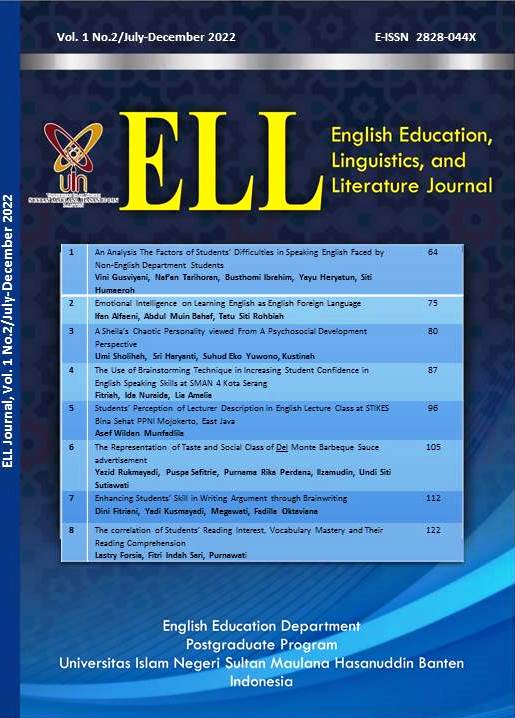Emotional Intelligence on Learning English as English Foreign Language
DOI:
https://doi.org/10.32678/ell.v1i2.6556Keywords:
Emotional Intelligence, Learning English as English Foreign LanguageAbstract
The focus of this study was on students' emotional intelligence when learning English as a foreign language in the eleventh grade of MA Al-Khairiyah Pipitan's social sciences major. The goal of this study was to find out why students felt frightened, nervous, and uninterested in studying English, as well as how to overcome their emotional intelligence. The participants in this study were ten men and women in their eleventh year of MA Al-Khairiyah Pipitan specializing in social sciences (5 males and 5 females). The researcher has only taken one class and is a social science major. This study was designed as a descriptive qualitative study, with data gathered through observation and interviews. The results revealed that students' emotional intelligence was divided into four categories: apprehensive (42.75%), nervous (26%), embarrassed (19.75%), and not confident (5.25%). Students have their own strategies for dealing with their emotions. As a result, many students had anxiety when learning English and the only method to overcome emotional intelligence was to study hard about English
Downloads
References
Bautista, Maria Laurdes S, Andrew B. Gonzalez. “Southeast Asian Englishes.” The Handbook of World Englishes. Blackwell, 2006.
Khothari, C.R. Research Methodology, Method and Technique (University of Rajasthan, Jaipur, India, New Age International Publisher.
Marquez P, Gil-Olarte MRP, Brackett MA, 2006. Relating emotional intelligence to socia competence and academic achievement in high school students.
Miles, Metthew B., A. Michael Huberman, Johny Saldana, Qualitative Data Analysis: A Methods sourcebook, third edition, (Arizona State University, 2014, New bury Park London, Delhi.
Namdar H, Sahebihagh M, Ebrahimi H, Rahmani A, 2008. Assessing Emotional intelligence and its relationship with emographic factors of nursing students. Iranian Journal of Nursing And Midwifery Research (JNMR), 13(4):145-149
Nunan, David. Research Method in Language Learning, (Cambridge University Press. New York : 1992).
ORegan K, 2003, September). Emotion and e-learning. Jounal of Asynchronous Learning Networks. 7(3): 78-92.
Patel, M.F. and Praveen M. Jain, English Language Teaching, sunrise publisher and distributor, (Vaishali Nagar: first publishing, 2008).
Pishghadam R, 2009. A quantitative analysis of the relationship between emotional intelligenceand foreign language learning. Electronic Journal of Foreign Language Teaching. 6(1):31-41.
Williford H, 2000. The Relationship between Emotional Intelligence and Academic Achievement in Eleventh Graders. Retrieved at 20, November, 2010 from: http://www.nadasisland.com.
Downloads
Published
Issue
Section
License
Copyright (c) 2022 Ifan Alfaeni, Abdul Muin Bahaf, Tatu Siti Rohbiah

This work is licensed under a Creative Commons Attribution-ShareAlike 4.0 International License.






